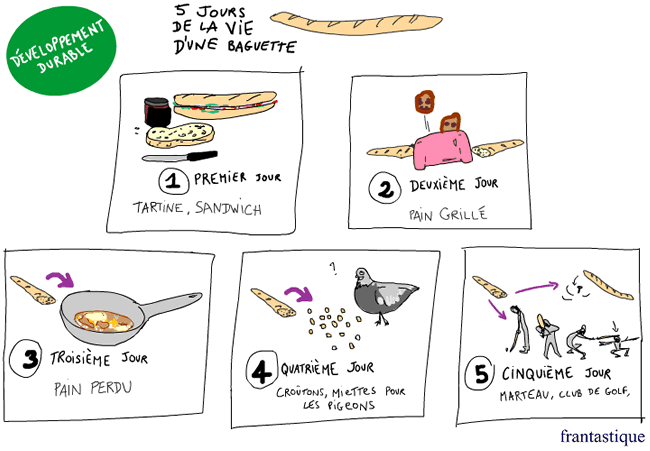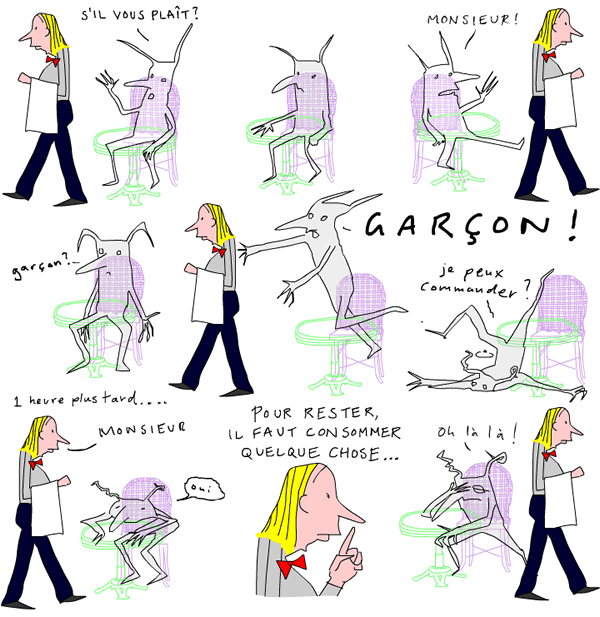| français | English | Cymraeg |
|---|---|---|
| avoir conscience (de qch) | (to be) aware (of) | ymwybodol (o); gwybod (am) |
| se rendre compte de | to become aware of | dod yn gyfarwydd â; dod yn ymwybodol o; dod i wybod |
| l’intoxication (f) alimentaire | food poisoning | gwenwyn bwyd |
| souscrire à | to subscribe (to an opinion) | cefnogi; arddel; coleddu |
| l’ovation (f) debout | standing ovation | cymeradwyaeth sefyll |
| on s’est levé pour l’acclaimer | he was given a standing ovation | cododd pawb i’w gymeradwyo |
| contrebandier | smuggler | smyglwr |
| trafiquant de drogue | drug smuggler | smyglwr cyffuriau |
| draguer | to dredge (a river) | carthu |
| les ouvrages anticrues; les ouvrages de protection contre les eaux |
flood defences | amddiffynfeydd llifogydd |
| la zone inondable | flood plain | gorlifdir; gwastatir; llifwaddod |
| être en crue | to flood (river) | gorlifo; llifo |
| occasionnel | occasional | ambell; ysbeidiol |
| la table d’appoint | occasional table | bwrdd bach |
| la flaque (d’eau) | puddle | pwll; pwdel |
Category: French (français)
Les mots de la semaine
| français | English | Cymraeg |
|---|---|---|
| adroit | dexterous | deheuig; llawdde; medrus |
| habile; qualifié | skilled | medrus; celfydd; crefftus |
| la trappe | trapdoor | trapddor |
| resquilleur | free-loader | sbwnjwr; progiwr |
| contagieux; infectieux | infectious | heintus; heintol |
| contagieux | contagious | heintus; ymledol |
| s’inviter à; entrer sans invitation | to gatecrash (a party) | ymwthio (i barti); gwthio’ch ffordd |
| la pâte brisée | shortcrust pastry | crwst brau |
| le poivron | sweet pepper | pupryn melys |
| directeur de thèse | academic supervisor | goruchwyliwr; arolygydd |
| les tissus d’ameublement (m) | soft furnishings | carpedi a llenni |
| la palourde | clam | cragen fylchog |
| la soupe de poisson | chowder | cawl |
| la semaine blanche | reading week | wythnos ddarllen |
La vie de baguette
The best-known type of French bread is the baguette, which was possibly introduced to France in the early 19th century by August Zang from Austria, though that’s another story.
Baguettes only stay fresh for a day, so what do you do with them once they start to go hard?
Here are a few possibilities:

Here’s a translation:
1. First Day: sliced with butter, sandwich
2. Second Day: toast
3. Third Day: French toast (“lost bread”)
4. Fourth Day: croutons, crumbs for the pigeons
5. Fifth Day: hammer, golf club
Image supplied by Frantastique, who can teach you all about the bizarre French cuisine, and help you to learn French.
I was told that if your baguette is a bit stale you can revive it by sprinkling a bit of water on slices and blasting them in a microwave for a short while. I haven’t tried this as I’m am microwaveless.
The French word baguette can also refer to:
– a magic wand = baguette magique; baguette de fée; baguette de sourcler
– chopsticks = baguettes chinoises
– conductor’s baton = baguette de direction; baguette de chef d’orchestre
– a drumstick = baguette de tambour
Expressions incorporating baguette include:
– sous la baguette de … = conducted by …
– faire marcher qn à la baguette = to rule sb with an iron hand
What are baguettes called in your country?
Multilingual musicians
A Sardinian friend of mine, Elena Piras, knows six languages (Sardinian, Italian, English, Scottish Gaelic, French and Spanish) and sings in most of them, plus a few others, including Scots, Bulgarian and Georgian.
Here’s a recording of a performance from earlier this year in which she sings in Sardinian, Scots, English, Scottish Gaelic and Bulgarian.
Elena aims to sing each language in as close to a native accent as possible, and I think she does this very well.
Another multilingual singer is Jean-Marc Leclercq or JoMo, who holds the world record for singing in the most languages in one performance: 22. I heard him doing this at the Polyglot Gathering in Berlin in May this year. His pronunciation in the languages I know didn’t sound entirely native-like, and it sounded like he had a strong French accent in the other languages.
Do you know other singers who sing in multiple languages?
How well do they pronounce them?
I myself sing in various languages, and try to pronounce as well as I can, but know I could do better.
Here’s a recording of a song I wrote earlier this year in the five languages I know best (English, French, Welsh, Mandarin and Irish):
[soundcloud url=”https://api.soundcloud.com/tracks/204200300″ params=”auto_play=false&hide_related=false&show_comments=true&show_user=true&show_reposts=false&visual=true” width=”100%” height=”300″ iframe=”true” /]
Les mots de la semaine
| français | English | Cymraeg |
|---|---|---|
| la fiche | flash card | cerdyn fflach |
| le dispositif d’écoute; le micro caché | bug (listening device) | |
| le bogue | bug (computer) | nam; diffyg |
| le virus; le microbe | bug (germ) | byg; clust |
| l’insecte (m); la bestiole | bug (insect) | pryf |
| mangeable | edible (palatable) | bwytadwy |
| comestible | edible (safe to eat) | da i’w fwyta |
| tremper | to dunk | gwlychu; trochi |
| trempé | soaked | gwlyb |
| trempé jusqu’aux os | soaked to the skin | gwlyb diferol; gwlyb diferol; gwlyb at y croen |
| un pétard mouillé | damp squib | matsien wleb |
| le pigeonneau | squab (baby pigeon) | cyw colomen |
| le fruit de l’imagination | figment of the imagination | dychmygu pethau; ffrwyth eich dychymyg |
Les mots de la semaine
| français | English | Cymraeg |
|---|---|---|
| la charnière; le gond | hinge | colyn; colfach; crogfach |
| le pot-de-vin | bribe | llwgrwobrwy; llwgrwobr; cil-dwrn |
| acheter; soudoyer; offirir des pots-de-vin | to bribe | llygru; prynu; llwgrwobrwyo; rhoi cil-dwrn |
| la corruption; la subornation | bribery | llwgrwobrwyaeth; llwgrwobrwyad |
| la corruption | corruption | llygredd; llygredigaeth |
| corrompu(e) | corrupt (person) | llygredig; llwgr |
| corrompre | to corrupt | llygru; difetha |
| le robinet à flotteur | ball-cock | tap pelen |
| l’accent (m) | emphasis (vocal stress) | pwyslais; pwys |
| le mot composé | compound word | gair cyfansawdd; cyfansoddair |
| le mot-valise | portmanteau word | cyfansoddair cywasgedig |
Polyglot Conference, New York
This weekend I am in New York for the 2015 Polyglot Conference. I arrived yesterday afternoon after an uneventful flight from Manchester. It took a couple of hours to get out of the airport, and another hour or so to Manhattan.
Last night I met up with some other polyglots near the Statan Island ferry terminal – we were planning to take the ferry over to Statan Island, but unfortunately it started raining heavily and we decided to postpone the trip. We explored Lower Manhattan and Greenwich Village for a while, then I went home, while the others went on to a bar.
The conference started this morning at the SVA Chelsea Theater, which is just around the corner from where I’m staying. There were talks all day about a variety of interesting subjects, including Forensic Linguistics, Proto-Indo-European and Lakota language revival. There are plenty of people here who I know from previous polyglot events, and I’ve met lots of new people.
So far I’ve spoken English, French, Spanish, Portuguese, German, Mandarin, Cantonese, Taiwanese, Japanese, Welsh, Irish, Scottish Gaelic, Manx, Esperanto and Toki Pona, and have met people who speak various other languages.
The conference continues tomorrow, and then I have a couple of days of sightseeing before returning to the UK.
Hi. Keefak? Ça va?

What language(s) do they speak in Beirut?
According to an interesting programme and article I came across today, many people in Beirut speak Arabic, French and English, and frequently switch between them, often using two of them, or all three in the same sentence.
While some might see this kind codeswitching as a sign that people haven’t learnt any of the languages completely, others believe it is a way people express their Lebanese identity. In fact, codeswitching requires a good knowledge of all the languages you’re switching between, especially when it occurs within sentences.
Are there other places where most people regularly codeswitch between three of more languages like this?
In Wales codeswitching between English and Welsh is common, and with some of my friends we add French, and/or other languages, into the mix.
Les mots de la semaine
| français | English | Cymraeg |
|---|---|---|
| les dentier | dentures | dannedd gosod |
| le chantier | building site | safle adeiladu |
| la dictature | dictatorship | unbennaeth; awtocratiaeth; teyrnlywodraeth |
| le dictateur | dictator | unben; teyrn |
| l’autocratie | absolute dictatorship | unbennaeth |
| une quinzaine; quine jours; deux semaines | fortnight | pythefnos |
| le dent de sagesse, le gros dent | wisdom tooth | cilddant olaf, cefnddant |
| poser sa candidature pour | to apply for (a job) | cynnig, ymgeisio, ymgynnig, gwneud cais |
| dépliant | leaflet | taflen; dalen |
| la disquette | floppy disk | disg llipa |
| déblie; allumé | geek, nerd | llipryn, gwlanen, brechdan |
| le monument classifié | listed builing | adeilad cofrestredig |
| le conseil d’administration | board (of directors) | bwrdd (cyfarwyddwyr) |
| l’affairiste; le magouiller | wheeler dealer | sgemiwr a sgiliwr |
| magouiller | to wheel and deal | sgemio a sgilio |
| mettre son nez partout | to have a finger in every pie | bod gan fys ym mhob brŵes/cawl |
| se mêler partout | to have a finger in many pies | bod gan fys ym mhob brŵes/cawl |
Waiter!
When you’re in a restaurant or café, how do you get the attention of a waiter/waitress?
This cartoon shows how it can be difficult in France.

The customer in the cartoon first says “Please”, then “Sir/Mr”, then “Waiter”, then ‘Can I order?’, then a hour later the waiter finally speaks to him and says, “Sir, to stay here you must have something to eat or drink.”
What’s it like where you are? Are waiting staff in restaurants quick to respond to you, or do they go to great lengths to ignore you? What do you call waiting staff?
I’ve worked as a waiter and as a barman and know that at busy times it can be difficult to respond to everybody immediately, but I’ve never ignored anyone deliberately.
Image supplied by Frantastique, who can teach you how do you get the attention of a French waiter, and help you to learn French.